BLACK AMERICANS’ KICK THE 21ST CENTURY CIVIL RIGHTS MOVEMENT INTO HIGH GEAR
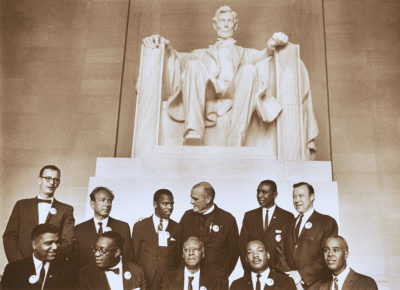
Pictured: (Standing l. to r.) Matthew Ahmann, Director of the National Catholic Conference for Interracial Justice; Rabbi Joachim Prinz; John Lewis, leader of the Student Nonviolent Coordinating Committee (SNCC); Protestant minister Eugene Carson Blake; Floyd McKissick, leader of the Congress of Racial Equality (CORE); and labor union leader Walter Reuther; (Sitting l. to r.) Whitney Young, Executive Director of the National Urban League; Cleveland Robinson, Chairman of the Demonstration Committee; A. Philip Randolph, labor union leader who conceptualized the march; Dr. Reverend Martin Luther King Jr.; and National Association for the Advancement of Colored People (NAACP) leader Roy Wilkins. Photo Courtesy of U.S. National Archives and Records Administration.
Thousands converged on the U.S. Capitol on August 28, 2020 to recommit to the calls for justice made on August 28, 1963. In 1963 was the March on Washington for Jobs and Freedom. Reverend Dr. Martin Luther King, Jr. delivered his legendary “I Have A Dream” speech.
More than a half-century later, the demands are the same with an added caveat: Speakers called for an end to the killing of unarmed black men, women, and children. Remember the 1955 mob lynching murder of Emmitt Till. That horror galvanized the modern civil rights movement.
The theme of the 2020 Commitment March was “Get Your Knee Off Our Necks.” The protest to the killing of George Floyd by police, who knelt on his neck for eight minutes and forty-seconds. Floyd’s family demanded justice at the Lincoln Memorial. Representatives of more than 20 unarmed blacks killed by police were present.
Victims of Police Violence and Systemic Racism
Breonna Taylor, Ahmaud Arbery, Rayshard Brooks, Elijah McClain, Botham Jean, Eric Garner, Trayvon Martin, Antwon Rose, Terrence Crutcher, Atatiana Jefferson, Jemel Roberson, Joel Acevedo, Dontre Hamilton, Michael Brown, David Jones, Emanuel Lee, Sandra Bland, and more.
Also present was the family of Jacob Blake, the unarmed black man who was shot seven times in the back at point blank range by a Milwaukee cop.
Organized by Reverend Al Sharpton’s National Action Network, and Martin Luther King, III, the son of the late Rev. Dr. Martin Luther King, Jr., elected officials, union leaders, church leaders, civil rights leaders and families of slain victims demanded justice but also legislation to protect black lives and to finally deliver equality.
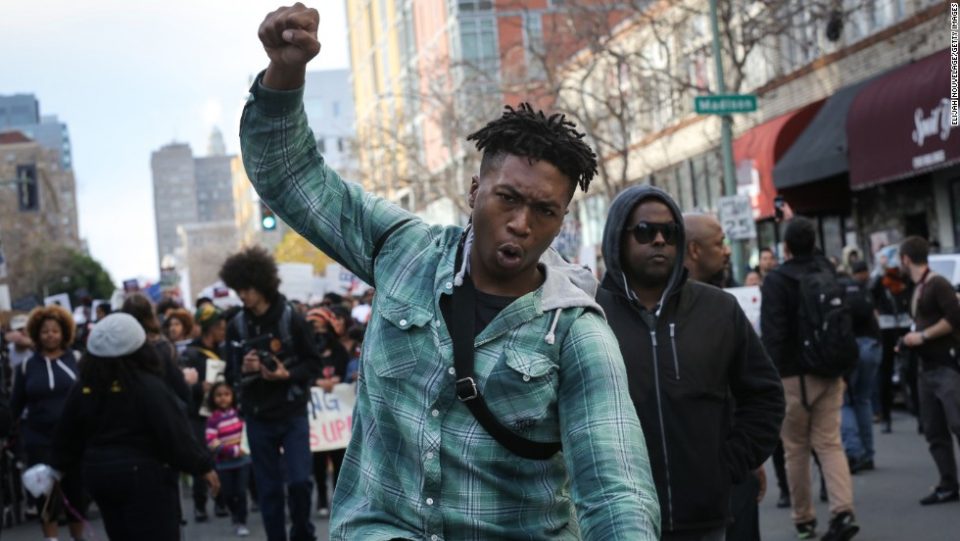
From Protest to Legislation
The move from protest marching and demonstrations to a focus on legislation signals the beginning of a new strategy in the 21st Century Justice Movement. Black leaders have always brought political pressure on whites, who at one point, held all the elected offices. What is different today is that more black and brown people are holding elective positions. And now multigeneration, multicultural groups are in the streets protesting. Now people of color and whites know that the only way to secure justice is at the ballot box. Only then can lobbying for change at local, state, and federal legislators be successful.
Speakers at the Commitment March made several demands-
- a federal ban on chokeholds
- the elimination of no knock warrants
- personal liability insurance for cops
- the release of non-violent offenders from prison
- an end to mandatory minimum sentencing
- the abolishment of the death penalty
- less restrictive voting
- and reforms in health care, housing, and a living wage, among others.
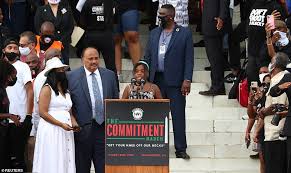
Martin Luther King III Speaks
“We’re marching to overcome the triple evils of poverty, racism, and violence. COVID-19 has laid bare the economic inequality. And voter purges, discriminatory practices, felons not able to vote. Now we have to risk our lives to cast our votes in lines during a pandemic. We need to be able to do what President Trump does, vote by mail. We need to vote like our lives, liberty, and future depends on it because they do. There is a knee on the neck of democracy…the simple challenge before us is that everyone can cast a ballot,” Martin Luther King, III told the crowd.
The Reverend Martin Luther King, III
“Dad said, ‘Everyone can be great because everyone can serve.’ He challenged us to become drum majors for justice. If you’re looking for a savior, get up and find a mirror. We must demand the U.S. Senate stop blocking the George Floyd Justice in Policing Act and John Lewis Voting Rights Act…Raise the minimum wage, demilitarize the police, get into good trouble, Non-violence doesn’t mean passivity.”
Rev Al Sharpton
According to Reverend Al Sharpton, “We want this country to know, your brutality and bigotry can’t rob us of our dreams, we are the dream keepers, which is why we come today, black, white, all religions and sexual orientations, you may have killed the dreamer but you can’t kill the dream, we are going to make this dream come true.
“We all should leave her committed to keeping this dream alive. Everyone who wants to help on election day, be poll watchers, sign up, early voting starts in two weeks. We have to have foot soldiers to protect our vote, but we are not going to submit anymore, you’re going to get your knee off of our necks. Enough is enough….no justice, no peace,”
Talib McMillan
Talib McMillan, a policy advisor for the National Action Network, said, “We find ourselves here in the spirit of Martin Luther King, Jr. We’re not here to negotiate or ask for justice, we are here to demand justice…it’s time for legislation to invest in education, mental health services, in communities and in HBCUS. We don’t just deserve a quarter of the dollar but the whole dollar…we’ve come to let the teller at the bank know this check better not bounce…we come to cash a check to demand justice.”
“We’ve come back to say today that our fight for racial justice is not negotiable. Purging our system of systemic racism and our right to vote is not negotiable, defending our right to a living wage, not negotiable; equitable funding for our school children, supplying rural areas with broadband is not negotiable, a fair Census, eliminating the structural shameful disparate impact of COVID-19, not negotiable; police reform, mental health services, homeless services, deaths of our black people are not negotiable. We’re here to make demands, George Floyd Justice in Policing Act must be passed, pass the Heroes Act, the John Lewis Voting Rights Act, and HR 40,” advised Marc H. Morial, NUL President and former mayor of New Orleans.
“Yes, it is possible to write budgets that address the needs of black lives,” Congresswoman Ayanna Pressley told the gathering.
Two days before the Commitment March, the Milwaukee Bucks walked out of the NBA playoffs, determined to demonstrate against the shooting of Jacob Blake in Wisconsin, their home base.
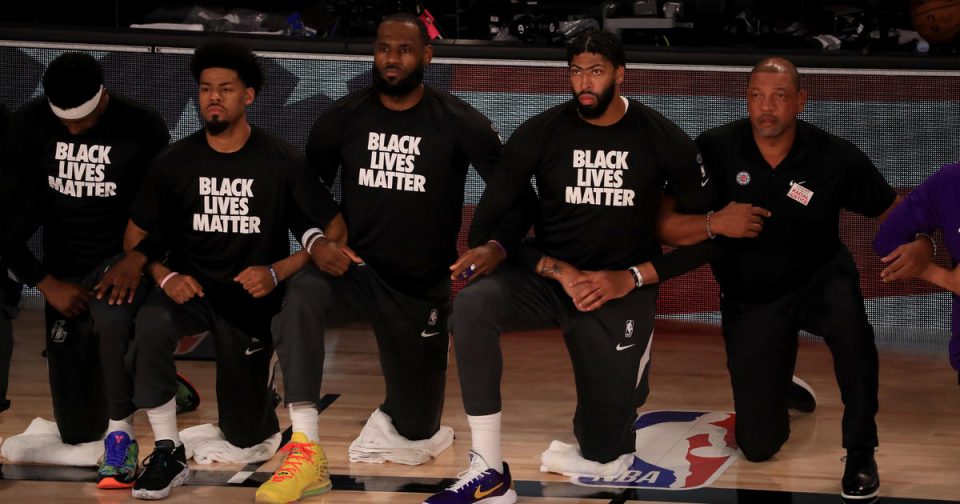
Professional Sports Teams Protest
They were followed by the rest of the NBA teams, the WNBA, MLB, MLS, NHL, and several NFL teams cancelled practices. The athletes did more than just walk away from their scheduled games. The Milwaukee Bucks team managers and coaches called the state’s Governor Tony Evers and the Lieutenant Governor Mandela Barnes and issued a demand for police reform legislation.
After several meetings, the NBA and the NBAPA (National Basketball Players Association) followed announced an “action” agenda and a slate of demands. The NBA and NBAPA agreed to form a social justice coalition to interface with governors and elected officials in their respective states. Hey plan to come up with legislation that leads to meaningful police and criminal justice reform. Players want to convert facilities owned by the teams into polling places for the 2020 general election. The NBA will work with networks to run an ad campaign in each playoff game to promote voting.
In an interview on AM Joy Show on MSNBC , Martin L. King, III said “We’ve got to change the direction of the U.S. Senate and the presidency. We have to vote but there is another strategy we can use, economic withdrawal.” King reminded us his father and the other civil rights leaders used economic boycott against the Montgomery Bus Company.
“Blacks spend $1.4 trillion annually. If black people used that power, politicians would come talk to us. And, instead of just marching, we need young people to run and get elected to offices at the local, state, and federal levels.”

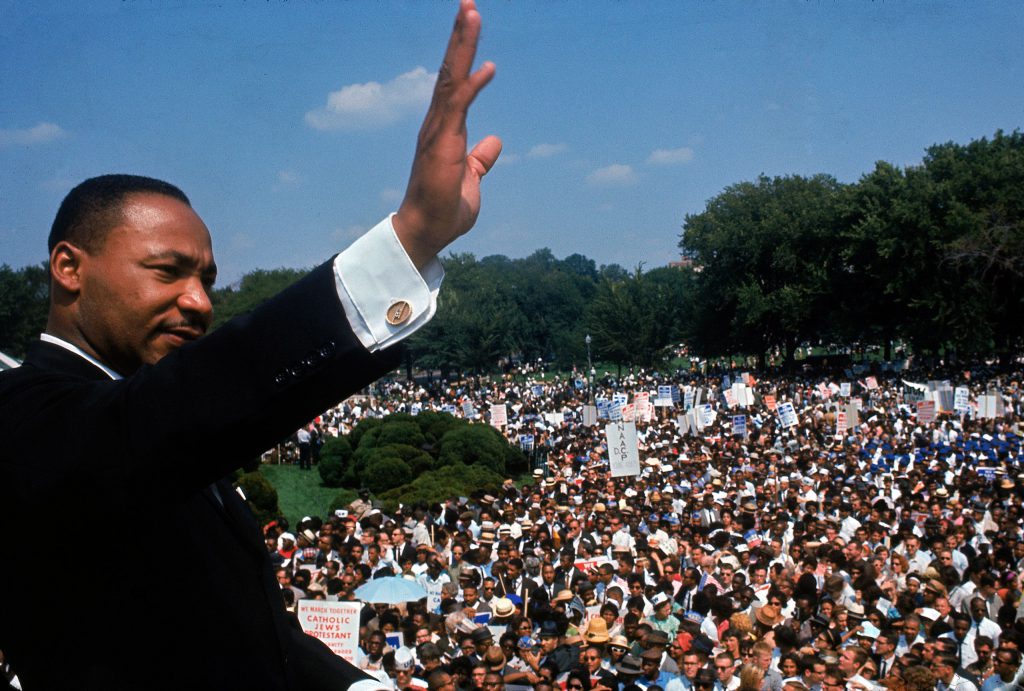
[…] Protests Will Continue […]